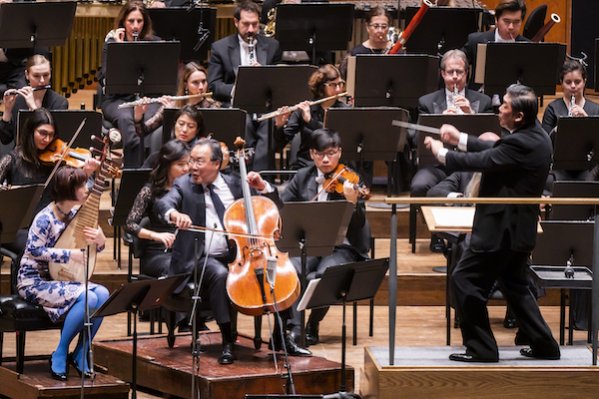A starry Chinese premiere and a sensational “Pathéthique” from Yu, Philharmonic

Wu Man and Yo-Yo Ma perform Zhao Lin’s “A Happy Excursion” with Long Yu conducting the New York Philharmonic Wednesday night at David Geffen Hall. Photo: Chris Lee
Wednesday night’s New York Philharmonic concert in David Geffen Hall was conspicuous for its star-studded premiere, but may end up being best remembered for something tried and true.
The new piece was A Happy Excursion by Chinese composer Zhao Lin. A Philharmonic co-commission with the Beijing Music Festival and Hangzhou Philharmonic Orchestra, the work is a concerto for pipa and cello. On hand to play the U.S. premiere were celebrated cellist Yo-Yo Ma and the great pipa player Wu Man. (The same artists gave the world premiere in Hangzhou last October.)
To open the concert, guest conductor Long Yu chose Mussorgsky’s Prelude to his opera Khovanshchina.
Big things can have small beginnings, and that was the case Wednesday. The Prelude, in Rimsky-Korsakov’s orchestration, was wan and underdone. Yu never drew the coalescing lines together effectively, and neither conductor nor orchestra sounded much interested in it.
Zhao’s concerto was something else entirely. It immediately grabbed the attention with a serious of sumptuous chords in the brass. This introduced the composer’s harmonic palette, which was full of gorgeous extended chords, positioned somewhere between the rich, modernized harmonies of Samuel Barber and Benjamin Britten.
The other compelling feature of the concerto was the blend of Ma’s vibrant sustained notes and Wu Man’s brilliant pipa, two sounds that balanced off each other with equipoise. The pipa is a delicate instrument, much like a lute, and Man’s ability to get an exciting sound out of it, and her ringing harmonics, were the most dynamic element of the performance.
Yet that arresting opening set up expectations that weren’t fully satisfied. The first two movements were articulate and full of color, the extended duos for Ma and Man were lovely, and there was a conversation between the pair and the orchestra that kept developing the music. The second movement was based on a traditional Chinese melody—over a thousand years old—and Zhao’s writing skillfully juxtaposed the ancient and the contemporary. One fascinating part was how each movement ended, with a brand new phrase appearing out of nowhere and left unresolved and hanging in the air.
Where the concerto disappointed was in the final movement, which didn’t have the thinking and personal voice of the first two. It was a standard rondo, and full of energy, but also trite, melodically and formally. After two movements that sounded like nothing else heard before, the last sounded like a John Williams film score, artificially proud and too eager to please.
The familiar work on the program was Tchaikovsky’s Symphony No. 6.
A venerable warhorse like the “Pathéthique” is always in danger of coming off as superficial. But the Philharmonic under Yu—one of China’s most active and prominent conductors—delivered a sensational performance, one of the finest this listener has heard. The playing had an etched crispness like that of the frigid winter wind outside the hall, and every section played with a keen-edged clarity and precision.
The performance was consistently impassioned, guided by Yu’s commanding view of the symphony. He laid out the long, complex first movement with a clear direction of the music’s ultimate point, taking each section and change in dynamic as a steppingstone along the path. He also held back the maximum level of intensity until the extreme crisis point in the movement. The strings urged the orchestra up to that summit with a stunning surge of power, Sisyphus pushing that boulder over the hill.
Yu managed the amazing feat of leading a rigorous third movement march while still keeping it objective enough that it did not have the usual feeling of finality. The despairing finale reached moments of explosive intensity that was almost nerve-wracking, making the tragic coda and tolling of the basses even more affecting.
This program will be repeated 7:30 p.m. Thursday and 8 p.m. Friday and Saturday. nyphil.org


